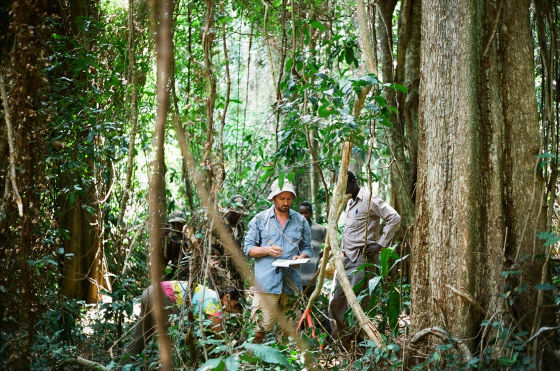60% of wild coffee species are in danger of extinction

by Nathan Dumlao
Research results published in Science Advances have revealed that about 60% of the wild coffee species on the planet are in danger of extinction due to the three ravages of disease, climate change, and deforestation .
High extinction risk for wild coffee species and implications for coffee sector sustainability | Science Advances
http://advances.sciencemag.org/content/5/1/eaav3473
60% of the planet's wild coffee species face extinction, study says
https://mashable.com/article/coffee-extinction-climate-change/
The botanists of the Queen Gardens, the Royal Botanical Gardens of England, were classified according to the International List of International Conservation Union for Nature Conservation (IUCN), which is used worldwide, based on the red list criteria. As a result, 75 species of 124 types of wild coffee About 60%) are in danger of extinction. According to a botanist, "Wild species hold a big key" to stably supply healthy, vibrant and flavorful coffee, and for those who drink tasty coffee, the results of this study are concerned It is said that it should do.
Aaron Davis, a senior research leader at the Queen Garden 's Plant Resources Division, is the first author of this research paper to point out that "wild coffee is on the verge of extinction". He says, "The coffee we drink can be drunk because wild species are available," he says that the crisis of wild coffee species threatens the genetic diversity of modern people 's drinking coffee varieties.

by Nathan Dumlao
The varieties of coffee beans can be classified into two types, "Robusta species" and "Canephora species", but the robusta type coffee beans that can be taken from Robusta coffee tree are almost known to exist until the early 1900's It was not.
Davis said about Robusta species, "It's amazing to have grown from a state of little known to the world's leading products."

by Dennis Tang
Coffee, like most other food items, is cultivated on a farm in modern times. However, wild coffee species that exist in specific areas such as Ethiopia and Sudan as these predecessors are in danger of extinction.
Davis et al. Research team said that in 2012, South Sudan 's Arabica , which occupies 60 - 70% of the world' s coffee, is the only place inhabited by land other than Ethiopia. The coffee collectors who visited the area 70 years ago said they told that they are "overflowing with wild coffee seeds", but now it is said that this land has changed dramatically about.
"The area that was once overflowing with coffee grounds in South Sudan is dry like bones and the landscape has completely changed in 70 years," says the advanced agricultural science on coffee on a global scale Mr. Hannah Nyuwwonder who works as the communication director at World Coffee Research , the only institution in the world that we are utilizing under the cooperative system.
It seems that almost no old seedlings of coffee beans and coffee trees were found on this land anymore, "If deforestation continues for 10 more years, nothing will remain," Davis says.
As it has not happened in the past 100 years, if you lose wild coffee, there is a possibility that breed improvement etc. to protect coffee varieties from diseases spreading together with global warming and climate change will not be possible .
Mr. Davis investigating wild coffee species in South Sudan

"The coffee industry is always faced with the challenges that we are aware of and the challenges that we do not yet understand, unless we protect wild coffee species that are in danger of extinction, , Probably lacking the ability to tackle problems that will occur in the future, because it does not have the tool kit genes , "he says, and thinks about the possibility that cases of coffee breeds will suffer from disease in the future , The need to protect the wild coffee species is high.
The variety of coffee grown around the world is said to be especially vulnerable to two climate changes, "global warming" and "drought." Nathan Mueller, associate professor at Earth System Science Department at the University of California, Irvine, who is studying food security, said, "The increase in greenhouse gases warms the earth, changes extreme heat and drought patterns It is said. Furthermore, it is important to preserve genetic diversity by protecting wild coffee species and newly producing new varieties of coffee beans resistant to changes in pests caused by climate change.
Together with Robusta coffee nooki and Arabica coffee, it is said that it can account for about 99% of the coffee distributed in the world. However, in past studies it is estimated that wild Arabica will become extinct in about 60 years.
"These research results pose a threat in the long run but may be more short-term than some people imagine, it sounds like a distant future, It can happen during our lifetime, "Nishwander says.

by Ozgu Ozden
One way to solve these problems is to save wild coffee in a seed bank . According to the researchers, it seems that about 55% of the wild coffee species is preserved in the seed bank, but that does not mean that you can rest assured. Because, some of the seed banks simply can not secure enough funds and can not be trusted. According to Nish Wander, some of the seed banks have facilities that manage stored seeds with handwritten notes.
Although the coffee industry is making efforts to preserve wild coffee, there is a possibility that it will cost more than 20 million dollars (about 2.2 billion yen), and "Coffee industry success There is a growing awareness that it depends on the state of health of plants, "says Nish Shander.
Related Posts:







